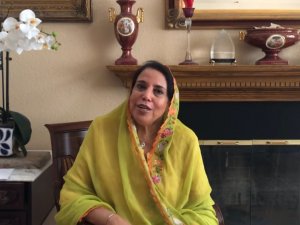Note: Toba Tek Singh is based on Sadat Hasan Manto's famous short-story set in post-1947. It is produced by Naatak, a premier Bay Area theatre company. It will be performed through 29th July at Woodside High School, Woodside California. Click here for more information on this production.To find out more about Naatak, check out their facebook page here.

Seventy years after the partition of India that was imposed by an external power, the collective social memory of the people affected by it is still raw. The bewilderment over what happened has spun tales of horrors witnessed firsthand, and nostalgia for the land that was once whole.
Natak’s Toba Tek Singh is based on a short story by Sadat Hasan Manto a controversial writer who like millions of others had to leave his home, belongings and friends in Punjab, cross an imaginary border and witness horrific brutality perpetuated on both sides of a country torn apart. The story was an indictment of both the Hindu and Muslim leaders who were complicit with the British.
Sujit Saraf, founder and artistic director of Naatak, adapted Toba Tek Singh for the stage and directed it. Saraf’s deftly written lyics move the narrative along, while the play straddles the absurd negotiations of political leaders with the British Viceroy Lord Mountbatten, and the antics of the lunatics in the asylum who try to make sense of the incoherent news they receive about the history in making outside the mental asylum.

Within the walls of the mental asylum, the news dwindles into nonsense — which is perhaps what is really happening in the outside world. The central character is Bishan Singh (played by Chanpreet Singh) a lunatic who neither sits nor lies down. It is said that he has not slept or spoken for years except spouting occasional gibberish and an oft repeated question in a haunting voice: “Where is Toba Tek Singh.” Bishan Singh was a wealthy farmer from a nondescript village named Toba Tek Singh. Fifteen years earlier he was dragged in chains by his relatives and dumped at the mental asylum. Bishan Singh may have lost his senses but not his yearning to know the whereabouts of his lost home.

One year after the partition, India and Pakistan decide it’s time to exchange their lunatics. The roll call is called and the lunatics line up to cross the border. Bishan Singh is missing. When dragged out of his hiding place, he refuses to cross over to an unknown, unfamiliar country until he knows where his home is. Someone finally has an answer. Toba Tek Singh has gone to Pakistan. Bishan Singh refuses to cross the border. He just wants to go home. As the agitated madman is pulled towards India at the Wagah border, he collapses with a piercing shriek. His body lies sprawled in the no man’s land right across the random border that splits the country. Just like Bishan Singh, millions have lost their homes, loved ones and their lives.

As India and Pakistan mark the 70th anniversary of their independence, Naatak’s Toba Tek Singh, a poignant satire, serves as a heart rending reminder of the pain and horrific experience of the millions who were uprooted from their homes. It absolves neither the Brits, who arbitrarily decided the fate of the subcontinent they had ruled for a hundred years, nor the Indian politicians, that many feel betrayed the country for their own ambitions. In a stroke of genius, Sujit Saraf makes the lunatics play the politicians and morph back into being inmates of the asylum. In one hilarious scene Jinnah, the President of Pakistan is called a lunatic by an inmate. The lines between the sane and insane blur while the stark insanity of the partition rings clear. Nachikata Yakkundi’s music, and the impeccably choreographed dances steal the show even as they advance the story. The set is beautiful and the costumes vibrant. The interleaving of the National Anthems of India and Pakistan hints at the inextricable and knotty relationship of the two countries. The rendition of the Indian National anthem in Bengali is pure ear candy.

The play is in Hindi and the English super-titles aptly translate the events in the play, but some of the nuances, and especially the jibes at the politicians may be lost to those in the audience who are unaware of the idiosyncrasies of the leaders and the history of the region. Still lingering in my ears, the plaintive cry of Bishan Singh looking for his home is sure to be felt by all like a punch in the stomach.
Interview with the directors
Photo Credit: Kyle Adler





